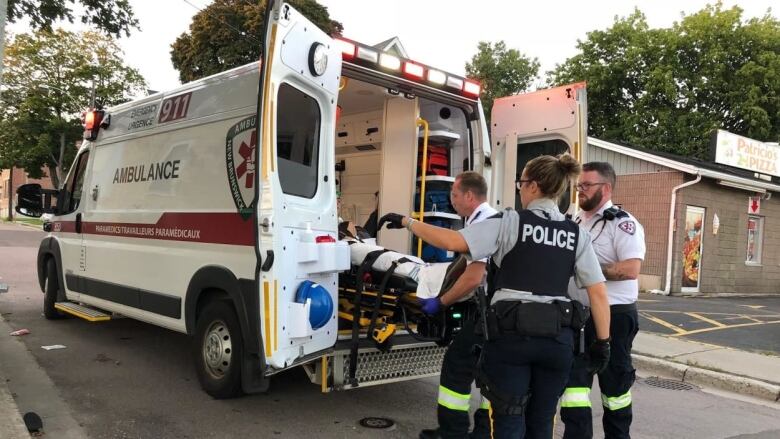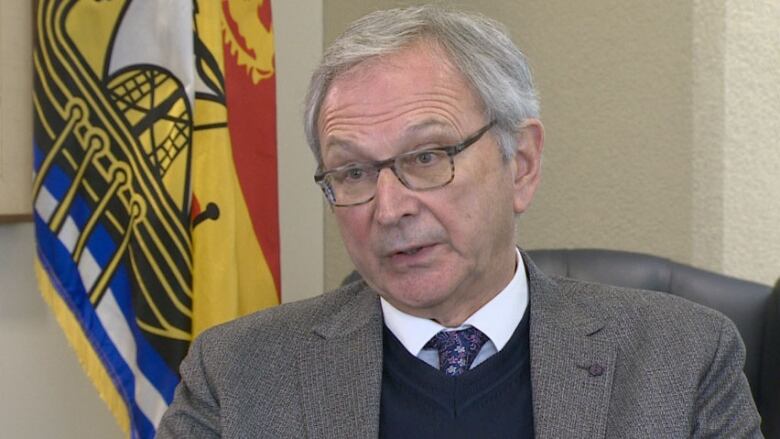Weakened bilingual requirements for paramedics violates languages act, says commissioner
Changes to Ambulance New Brunswick hiring practices 'must not be implemented,' argues Michel Carrier

New Brunswick's official languages commissioner says newly announced changes to hiring practices at Ambulance New Brunswick violate the Official Languages Act and should not go ahead.
Michel Carrier said in a statement that he's been assured by the Higgs government that it intends to respect the law and that means the changes "must not be implemented as they compromise the respect of New Brunswickers' language rights."
Earlier this week, Health Minister Ted Flemming said he was directing Ambulance New Brunswick to weaken bilingual hiring requirements for paramedics in areas of the province where there is less demand for service in a second language.
The change is based on recommendations from a labour arbitrator's ruling last year.
John McEvoy held that the organization's temporary filling of bilingual-designated positions with unilingual paramedics was interfering with seniority rights and recommended loosening bilingualism requirements in some regions.
The ruling is now the subject of a judicial review to determine if it violates the language act as well as language provisions of the Charter of Rights and Freedoms. They both require New Brunswick to offer bilingual service in all parts of the province.
Carrier's statement disputedFlemming's assertion that changing the hiring requirements will improve ambulance response times.
"Since the beginning of the controversy surrounding language requirements for certain paramedic postings, some have tried to have us believe that we must make a choice between ambulance services and language rights," he said.
"To our knowledge, Ambulance New Brunswick has never removed ambulances from circulation due to the fact that paramedics were unilingual."
He also saidother provinces that don't have bilingualism requirements are experiencing paramedic shortages because of working conditions and wages.

Premier Blaine Higgs credited Carrier this week with helping to convince him to go ahead with the judicial review of the McEvoy decision.
"In this situation, what I learned is that the Constitution and the way it's worded would suggest that there needs to be clarity," Higgs said in an interview with CBC News.
Higgs said the implementation of the McEvoy recommendations was only an "interim step" until the province could find more bilingual paramedics.
Seeks intervener status
Carrier's statement followed his application earlier Thursday to intervene in the review hearing of the McEvoy decision.
Carrier's lawyer Michel Doucet argued a report from his office in 2014 on bilingual ambulance services was "the starting point" for the labour arbitration now before the courts.
The previous Liberal government said that McEvoy's decision contradicted a 2017 consent order in which the province committed to bilingual ambulance service of equal quality in all parts of New Brunswick.
The order, signed by Court of Queen's Bench Justice Zol Dionne and by lawyers for the province and Ambulance New Brunswick, said both the Official Languages Act and the Charter of Rights and Freedoms require bilingual service everywhere.
Glen Gallant, the lawyer for the Canadian Union of Public Employees Local 4848 that represents paramedics, argued Thursday that Carrier should not be allowed to intervene in the case.
"This does not affect how the commissioner fulfills his role," he argued.
But Doucet said the commissioner could help the court hearing by providing information on how the language law is interpreted.
Lawyers for the province did not take a position Thursday on whether Carrier should get intervener status.
Premier doesn't want to 'pre-suppose'

Flemming said Tuesday if the review quashed the McEvoy ruling, he would still implement the changes to hiring requirements, and would stop only if a court ordered him to.
That prompted Higgs to assure francophones on Wednesday that his government respects the rule of law and would continue to enforce the Official Languages Act.
Even so, Higgs wouldn't say in an interview Thursday how the government will react if McEvoy'sarbitration decision is struck down.
"I don't want to pre-suppose what might happen with that, but I guess I'd say health care is a primary concern," he said. "We'd have to figure out how we'd deliver on that, because you can't let people not be served."
Higgs said the province won't argue whether the McEvoy ruling is constitutional or not but will merely ask the court to provide its interpretation.
Justice Denise LeBlanc said she'll rule soon on whether Carrier can intervene. The main hearing on the McEvoy ruling is scheduled for Jan. 24.
With files from Jacques Poitras and Michel Nogue












_(720p).jpg)


 OFFICIAL HD MUSIC VIDEO.jpg)
.jpg)



























































































